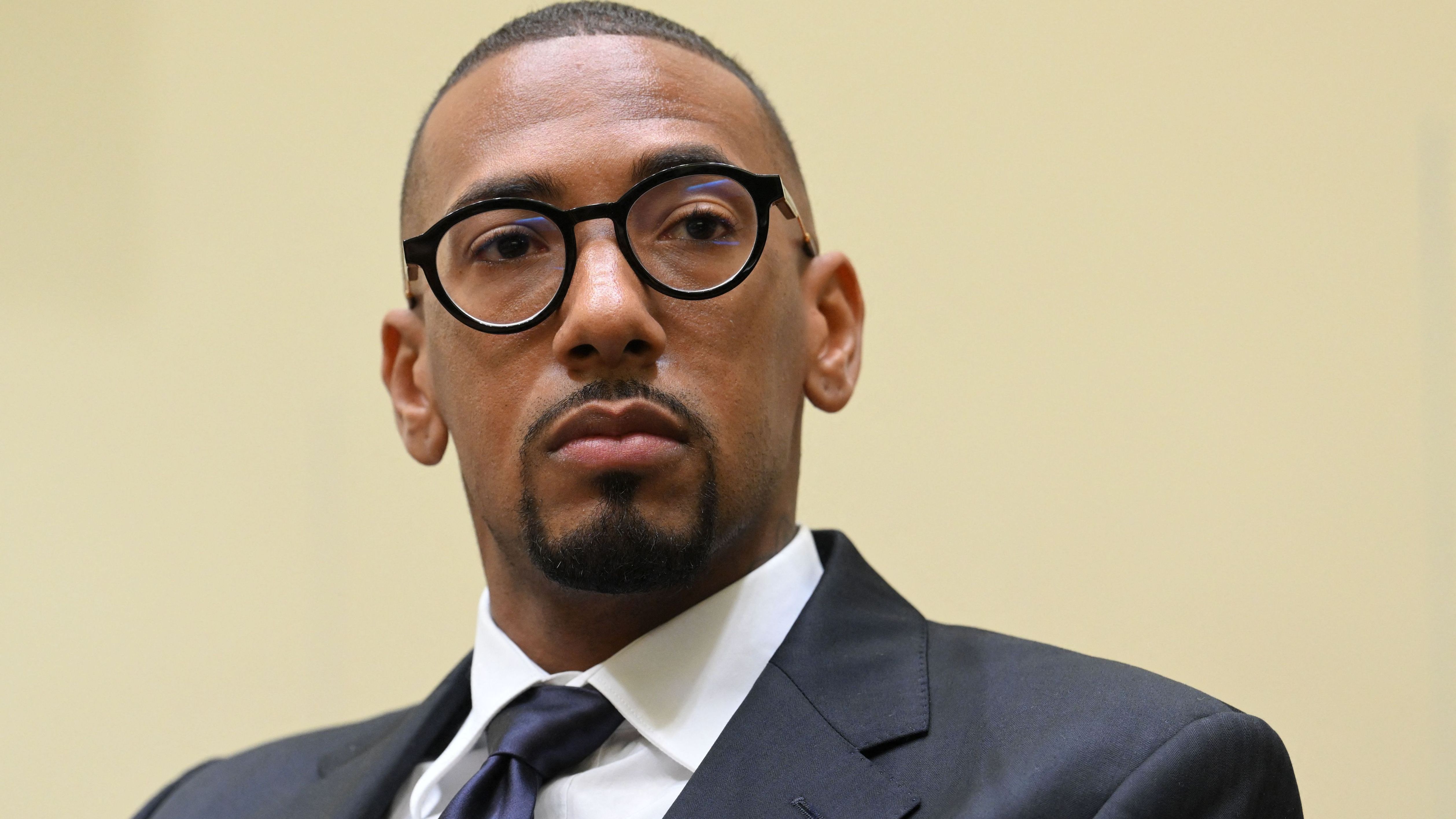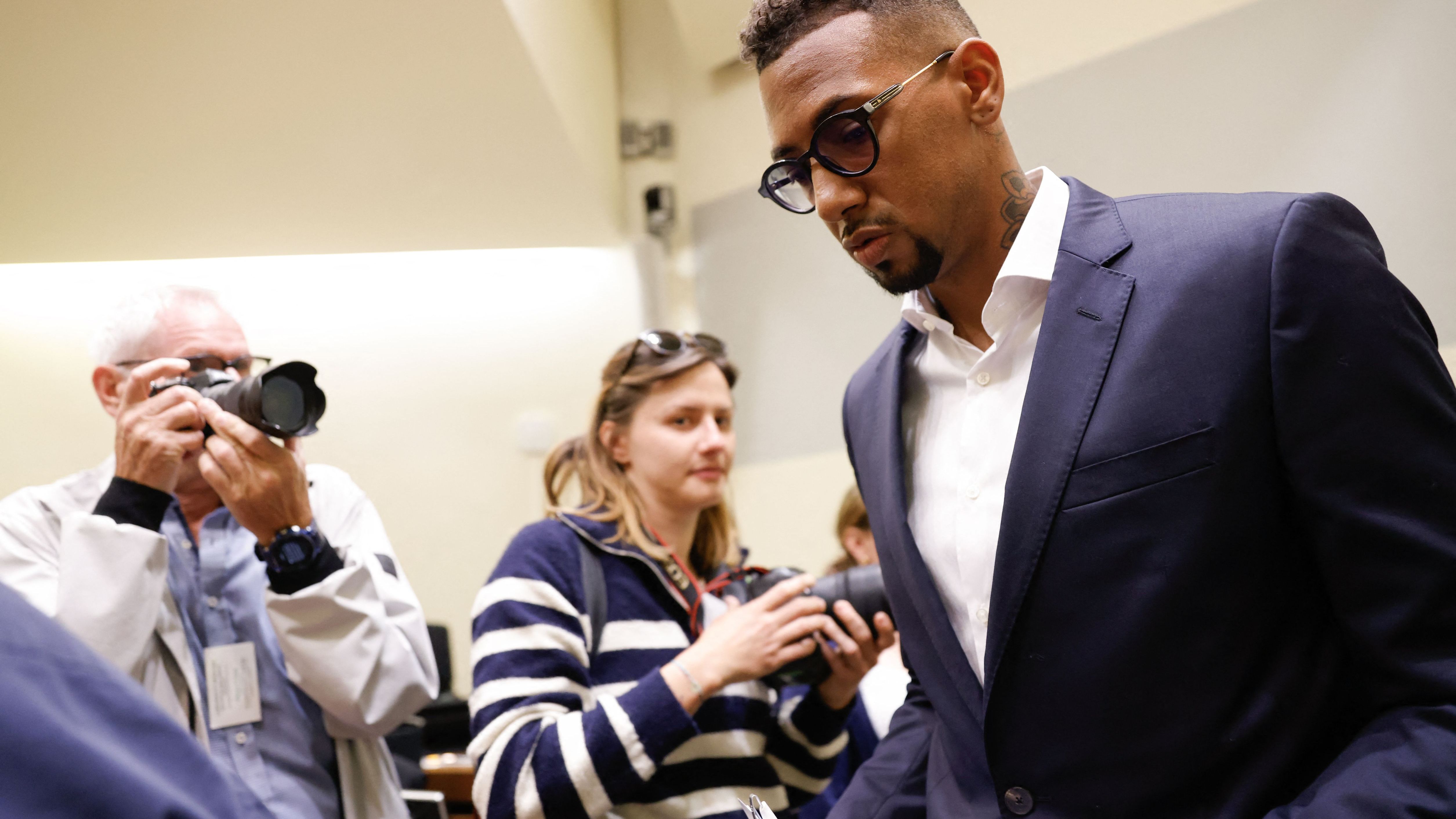


A Shocking Twist in Jerome Boateng’s Post-Career Journey with Bayern Munich
In a surprising turn of events that highlights the power of fan influence in football, Bayern Munich has abruptly ended plans for Jerome Boateng‘s internship under Vincent Kompany, driven by widespread protests over the former defender’s past conviction. This development underscores the delicate balance between personal redemption and public accountability in the world of professional sports.
Bayern’s Original Vision for Boateng’s Comeback
Initially, the German giants had envisioned welcoming the decorated player back into the fold in a supportive advisory capacity alongside Kompany. This straightforward yet meaningful arrangement would have allowed the 2014 World Cup champion, who dedicated ten years to Munich and secured nine Bundesliga championships along with two UEFA Champions League titles, to kick off his transition from athlete to coach right where his storied career flourished, gaining essential insights into leadership dynamics.
Approval and Enthusiasm from Key Figures
The organization sanctioned this temporary placement as a component of Boateng’s pursuit of his A-license qualification, offering him direct exposure to one of Europe’s premier tactical environments. Kompany, having been a teammate with Boateng at Manchester City, reportedly showed keen interest in incorporating him into the team in a role aimed at fostering growth and expertise.
The Rapid Escalation of Fan Opposition
What started as a discreet effort soon erupted into a major controversy. Supporters of Bayern Munich mobilized demonstrations both digitally and at the Allianz Arena, voicing strong disapproval of the choice and referencing Boateng’s 2024 ruling for deliberate physical injury. Advocates displayed signs proclaiming “Violence Has No Home at Bayern,” while an online campaign named “Draw Lines Against Gender-Based Abuse” collected thousands of endorsements almost immediately, ultimately compelling both Boateng and the club to mutually agree to terminate the agreement.
Boateng’s Personal Reflection on the Decision
For the ex-defender, calling off the internship represented a difficult yet strategic choice. The onetime Bayern central defender, who had openly shared his excitement about rejoining the Sabener Strasse setup, recognized the emotional strain caused by the uproar. Nevertheless, he stressed his commitment to reconstructing his path and making positive contributions to the sport in alternative ways.
Boateng’s Public Statement
Through an Instagram update, Boateng shared: “Following the ongoing conversations about my situation, I’ve chosen to concentrate on my key areas – the A license, RYZR, and Arena2. That’s my primary attention now, and I encourage everyone to direct their efforts toward the field and sustaining this remarkable run of 13 straight wins.”
Club’s Official Response and Its Implications
The team aligned with Boateng’s view in their official social media release, stating: “After a productive dialogue between FC Bayern and Jérôme Boateng this week, we have agreed that Jérôme will not proceed with the internship at FC Bayern. Jérôme maintains a deep bond with the club and wishes to prevent any harm to FC Bayern amid the present heated discussions.”
Impact on Club Relations and Wider Debates
This step helped ease mounting conflicts with the fanbase, preserving the club’s reputation and solidarity. Nonetheless, it sparked renewed conversations about second chances in football and the challenges faced by athletes with prior legal entanglements in restarting their professional lives.
Roots of the Controversy in Boateng’s Legal Past
The intense reaction to Boateng’s potential return originates from a prolonged six-year court battle that loomed over the end of his playing days. The incident traces back to July 2018, involving allegations of an attack on his ex-partner, Sherin Senler, during a getaway in the Turks and Caicos Islands.
The Evolution of the Court Proceedings
Boateng maintained his innocence throughout, but the matter endured several appeals and new hearings. A Munich court first imposed a fine of €1.8 million in September 2021, which was adjusted down to €1.2 million on appeal. The ultimate decision in July 2024 resulted in a suspended fine of €200,000 and a requirement to contribute €100,000 to a charitable cause, without adding a criminal mark to his record. The judiciary highlighted the need to safeguard the couple’s children, labeling them as the true sufferers in this extended ordeal.
Long-Term Effects on Boateng’s Career
Although the outcome avoided imprisonment, it severely damaged his public image. The fallout influenced his last few seasons on the pitch, restricting future team opportunities. Following his exit from Bayern in 2021, he took on short-term roles in France and Italy before stepping away from the game in 2025, marking the close of an illustrious era with more than 300 matches, nine Bundesliga victories, six DFB-Pokals, and two Champions League triumphs.
Looking Ahead: Open Doors and New Pursuits
Even though the internship plan was abandoned, Bayern Munich affirmed that pathways to the organization remain available in spirit. The leadership team and Kompany individually expressed appreciation for Boateng’s cooperation, noting that his significant role in the club’s history will endure.
Details from Insider Sources
Informants within Bayern revealed that the initial blueprint had Boateng assisting the coaching group until early 2026, but the strong fan opposition rendered it impossible. Kompany has openly backed the resolution while emphasizing the importance of concentrating on the squad’s current pursuits.
Boateng’s Shift to Fresh Ventures
In response, Boateng has redirected his efforts toward future goals, such as finalizing his UEFA A coaching certification, growing his sports recovery enterprise RYZR, and advancing Arena2, an initiative centered on enhancing community sports programs.
Background on Jerome Boateng’s Career and Controversy
When it comes to high-profile football stories, the case of Jerome Boateng and Bayern Munich stands out as a prime example of how off-field issues can shake up a club’s reputation. Boateng, a former star defender for Bayern, had a decorated career that included multiple Bundesliga titles and Champions League triumphs. However, his legacy took a hit due to legal troubles that sparked widespread debate in the football community.
Boateng’s Rise and Fall at Bayern Munich
Jerome Boateng joined Bayern Munich in 2011 after stints at clubs like Manchester City, quickly becoming a key player in their defense. Over the years, he helped the team dominate German football, contributing to their success with his strong tackling and leadership on the pitch. But by 2021, things changed dramatically when he faced conviction for intentional bodily harm related to a domestic incident. This event not only affected his playing career but also raised questions about accountability in sports, with fans and activists calling for stricter standards on player conduct.
The conviction led to intense scrutiny from the media and public, highlighting how Bayern Munich termination decisions could be influenced by broader societal pressures. Keywords like “Jerome Boateng conviction” started trending as discussions around ethics in football gained momentum.
Public Reaction and Ongoing Debate
Following the conviction, fan protests over Jerome Boateng’s actions became a rallying point for those advocating for change in how clubs handle such cases. Social media played a huge role, with hashtags like #NoToBoateng and #BayernEthics going viral, emphasizing the need for clubs to prioritize values over star power. This backlash wasn’t just about one player; it reflected a growing demand for transparency and responsibility in football, making “fan protests Bayern Munich” a common search term.
The Internship Announcement and Fan Backlash
In a surprising move, Bayern Munich announced that Jerome Boateng would take on an internship role in 2023, possibly to help with youth development or club operations. This decision was seen by many as an attempt to rehabilitate his image, but it quickly backfired, leading to a wave of fan protests that forced the club’s hand.
Details of the Internship Program
The internship was initially positioned as a way for Boateng to give back to the club that shaped his career, focusing on coaching young talents and sharing his defensive expertise. Bayern Munich’s leadership might have viewed this as a step toward redemption, but critics argued it glossed over the seriousness of his conviction. Terms like “Bayern Munich internship termination” surged in online searches as details emerged, revealing the internship’s vague structure and lack of clear guidelines on participant eligibility.
Escalating Fan Protests and Social Media Outcry
Fans didn’t hold back, organizing protests outside the Allianz Arena and using platforms like Twitter to voice their discontent. Chants and banners reading “No Place for Abusers” highlighted the disconnect between the club’s actions and its fanbase’s values. This unrest was fueled by groups advocating for women’s rights in sports, turning the “Jerome Boateng fan protests” into a broader conversation about accountability. In fact, petitions gathered thousands of signatures, putting immense pressure on Bayern to reconsider their stance and avoid further PR damage.
Bayern Munich’s Decision to Terminate
Faced with mounting pressure, Bayern Munich ultimately decided to terminate Jerome Boateng’s internship, marking a pivotal moment in how clubs respond to public sentiment. This move underscored the influence of fan voices in modern football governance.
Official Statement and Club Response
Bayern released a statement acknowledging the fan concerns, stating that the internship was being ended to maintain the club’s integrity and community trust. While the exact wording avoided direct criticism, it signaled a shift toward more proactive handling of controversies, with phrases like “Bayern Munich termination” dominating news cycles. This response was a win for transparency advocates, showing that fan-driven campaigns can lead to real change.
Implications for the Club and Future Players
The termination raised important questions about how Bayern and other clubs might handle similar situations moving forward. For instance:
- Impact on Club Culture: It could lead to stricter vetting processes for internships and roles, ensuring alignment with ethical standards.
- Fan Engagement Strategies: Clubs may need to enhance communication with supporters to prevent backlash, perhaps through regular feedback sessions or social media polls.
- Broader Football Ethics: This event might inspire policy changes in leagues worldwide, emphasizing rehabilitation only after genuine accountability.
In the aftermath, Bayern’s decision highlighted the evolving role of fans in shaping club policies, with potential ripple effects on player contracts and public relations.
The Impact on German Football and Society
This incident has left a lasting mark on German football, prompting discussions about ethics beyond the pitch. Terms like “Bayern Munich ethical standards” have become key in SEO searches, as people seek insights into how clubs balance legacy with modern values.
Societal Reflections and Fan Movements
The protests revealed deeper societal issues, such as gender-based violence and the role of sports in addressing them. Activist groups praised the outcome, using it as a case study for why “fan protests over conviction” matter. Bullet points of key events include:
- Timeline of Events: Starting with Boateng’s 2021 conviction, escalating to the 2023 internship announcement, and culminating in termination within weeks due to protests.
- Media Coverage: Outlets analyzed how this affected Bayern’s brand, with comparisons to similar cases in other sports.
- Long-Term Changes: Expect more clubs to adopt codes of conduct, potentially influencing youth programs and player development.
By examining this event, we see how football intersects with real-world issues, making “Jerome Boateng Bayern Munich” a topic that continues to educate and engage audiences. As searches for related keywords grow, this story serves as a reminder of the power of collective voices in driving positive change.









